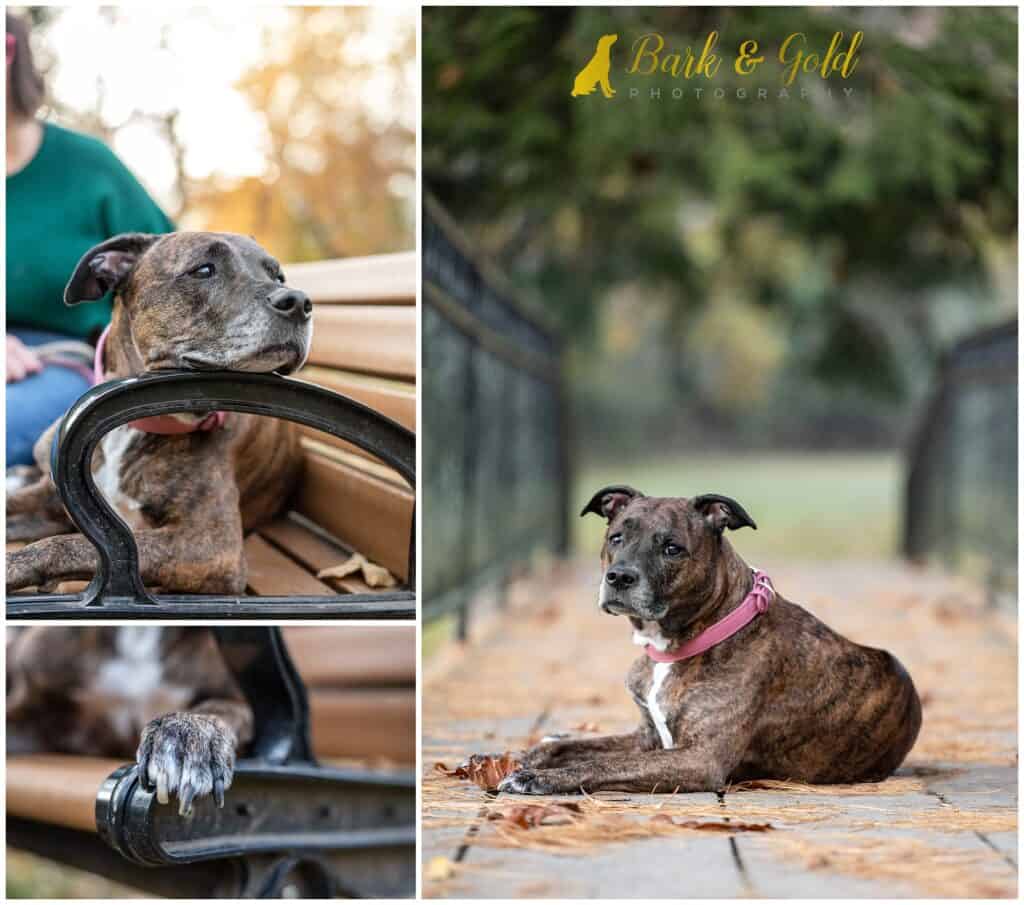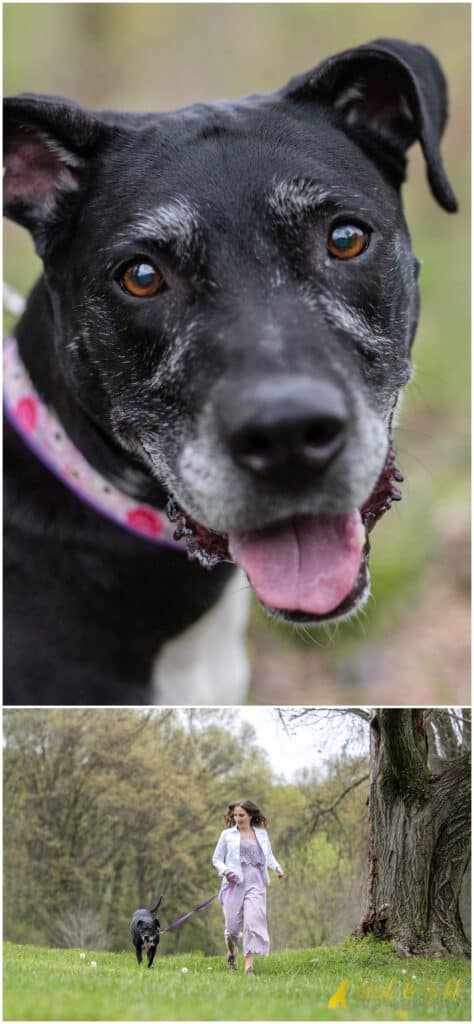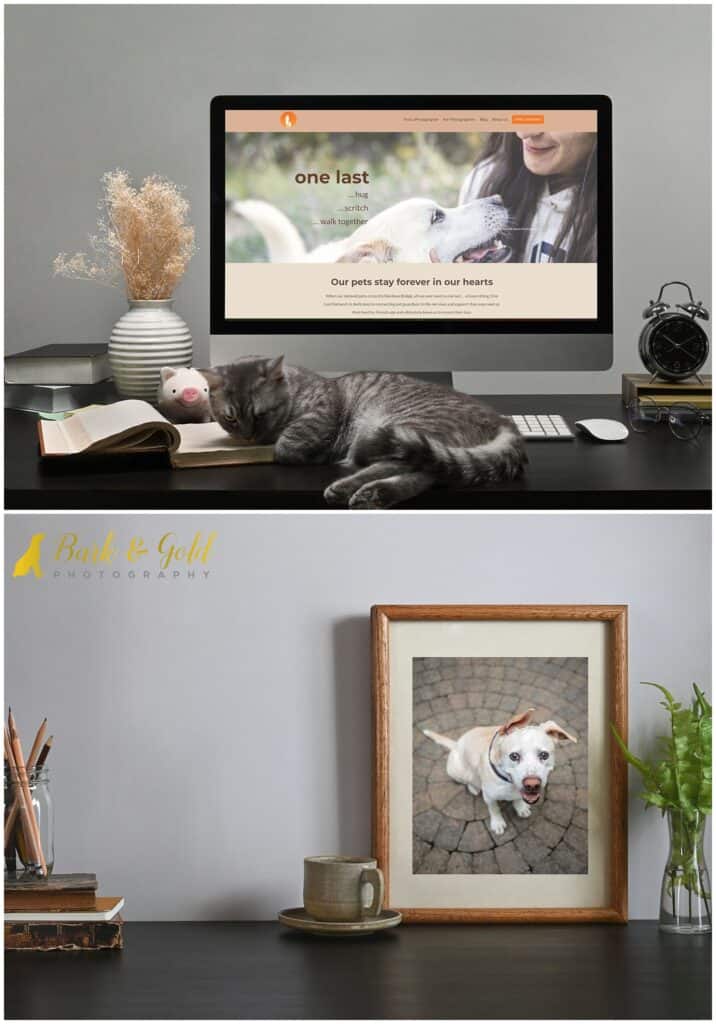“Blessed is the person who has earned the love of an old dog,” imparts Sidney Jeanne Seward who speaks to the beauty and gift of our gray-muzzled friends.
And what an incredible blessing that is.
These aged souls—whitened with wisdom, appreciative with their quiet contentment, and boasting years of experience in the fine art of friendship—give us so much of themselves and expect so very little in return.
They’ve seen us at our best…and our worst (and through those very times as well), provided a comforting constant when we’ve longed for calmness amidst the chaos, and taught us more about love, life, and loyalty than we could never have imagined.
I don’t know who said it—“I can’t think of anything more rewarding than making the last years of a pet’s life the best that they can be”—but I couldn’t agree more. There are few more honorable roles than that of a senior dog guardian.
The Importance of Self-Care for Senior Dog Guardians
While the desire to enhance the life of your senior dog is faithful, well-intentioned, compassionate, and often self-sacrificing, these efforts can precipitate related issues like compassion fatigue, burnout, caregiver stress, and anticipatory grief.
Dr. Mary Gardner, co-founder and CTO of Lap of Love, in the article ”Caregiver Burden: When Loving Hurts” says, ”Owning a pet can bring so much joy into our lives but when they become sick and require a lot of specialized caregiving—it can become stressful to an owner. Two reasons why caregivers burn out is because they place unreasonable burdens upon themselves, in part because they see providing care as their exclusive responsibility and they cannot recognize when they are suffering burnout and eventually get to the point where they cannot function effectively. They may even become sick themselves.”
You may have heard the adage, “You can’t pour from an empty cup,” and the trending “self-care isn’t selfish,” and as cliché as these may sound, they’re true.
While you have a responsibility to your senior companion to give him the quality of life he deserves, you also have a responsibility to be at your best so that you can give him the best. You can’t be at your best when you’re feeling anxious, alone, depressed, withdrawn, helpless, irritable, and emotionally and physically exhausted. To care for others, be mindful that you’re first caring for yourself.
In this post, I’m sharing five tips you can implement today if you’re looking for ways to improve your self-care as you strive to provide the most comfortable and fulfilling life for your senior dog.
1. Recognize and Acknowledge Your Thoughts and Feelings.
Call it embracing the suck or, more eloquently, emotional validation. Whatever you name it, do not underestimate the importance of recognizing and acknowledging your thoughts and feelings surrounding your pet’s situation.
“Self-validation involves recognizing and accepting your own thoughts and feelings,” explains Kristalyn Salters-Pedneault, Ph.D. in her Verywell Mind article, ”What is Emotional Validation?”, which reinforces how emotional validation connects us more easily to self-compassion, which reinforces the value of our emotions and helps us avoid shame and self-blame.
You may be experiencing shock, denial, disbelief, hope, longing, frustration, fear, detachment, overwhelm, sadness, anger, guilt, numbness, loneliness, or anxiety. Give yourself permission to feel it all…to sit in the discomfort, to embrace the uncertainty, and to do so authentically and without judgment. Doing so allows you to not only better understand yourself, but also welcomes grace and truth to your situation. You learn to develop a stronger identity of who you are, to more completely step into your role as a senior dog guardian, and manage the wide range of emotions you feel.
“Validation means to express understanding and acceptance of another person’s internal experience, whatever that might be,” explains Karyn Hall Ph.D. and the author of The Emotionally Sensitive Person, Mindfulness Exercises, and co-author of The Power of Validation in a Psychology Today article. “Validation does not mean you agree or approve. There are many times that you will have thoughts that surprise you or that don’t reflect your values or what you know is true. You will also have feelings that you know aren’t justified. If you fight the thoughts and feelings or judge yourself for having them, then you increase your emotional upset. You’ll also miss out on important information about who you are as a person.”
Journaling, meditating, incorporating breathwork, cognitive reframing, spending a few minutes each day in solitude, or adding a daily gratitude practice are small activities that can significantly impact what pet loss grief counselor Beth Bigler of Honoring Our Animals describes as “choosing to be at peace with what has happened, what is happening, and what will happen.”
2. Make a Plan.
Your vet can an essential resource in helping navigate what is an uncertain, unavoidable, and often difficult reality.
Guardians of senior pets without known health issues and pre-existing conditions are encouraged to plan regular vet visits twice a year for geriatric screenings as well as routine checkups. During these appointments, your vet will likely review your pet’s health history, activity level, and diet; perform typical physical assessments, urinalysis, and bloodwork; administer vaccinations and boosters; test for parasites, tick-born diseases, and heartworm; and hold space for you to ask any questions or express concerns you may have regarding the health and happiness of your senior dog to form a plan of care that approaches pain management, hospice and palliative care, and end-of-life issues.
Having an open discussion about the various options available to help your senior dog age gracefully as well as when it’s time to make important decisions surrounding his quality of life will provide confidence and courage in knowing that you have all the support, knowledge, and resources you need to move forward and take the next best step for your loyal friend.
Related: 3 Gifts an End-of-Life Session Offers As Your Pet Prepares to Cross the Rainbow Bridge
3. Focus On What You Can Do.
While often easier said than done, focusing on what you can do and control given the gravity of the inevitable. Guilt or feeling that you’re not doing “enough” is normal; however, understand that, no matter how hard you try, being a perfect caregiver to your sweet sugar face is impossible.
Be conscientious about not blaming yourself for things you cannot control. Believe that you are doing the best you can and that your dog knows that you are making the most informed and dignified and appropriate decisions for him that you can at the time. And always out of love. Choose grace over guilt. Trust that you are doing your best and that those efforts are enough.
4. Be Present.
When your daily focus centers around ensuring your senior dog is as happy and healthy as he can be, it can feel challenging to be present and to even do the things you once enjoyed together; however, finding joy in the present moment can help you find things to look forward to and connect with your dog on a deeper level.
“With an understanding of empathy, we can consider better how to be present within the space of grief,” says David Teachout in ”Being Present in the Space of Grief.”
“Our ability to be present in with another’s grief, to share the bond of humanity, is expanded or limited by the vision of our lives. Merely acknowledging that the way we see the world does not encompass all of it allows empathy to grow,” adds Teachout. “Actively engaging in experiences that move the boundaries of our comfort allows empathy to expand. When being present in the space of grief, we are taking part in a fundamental process of the universe, the cornerstone of the human spirit, that of relational reality.“
“In the context of grief, I tend to think of joy in three buckets: the joy you experience independent of grief, the joy that arises in the midst of grief, and the bitterness that comes in otherwise joyful moments because of all that you’ve lost,” elaborates Marisa Renee Lee in her book Grief Is Love: Living With Loss. “Joy may feel like an indulgence, but it is not. Joy is a basic right. Don’t feel cast aside from your grief; you need to entitle yourself to the joy you deserve.”
To know that right here, in this very moment, everything is OK is a poignant gift to yourself and your dog.
“If you are going to live a full life after loss, you have to find your way back to joy,” Lee adds. “Do not feel like you are betraying your person by experiencing joy. Experiencing joy is one of the many ways you can continue to love them.”
Related: 3 Reasons to Book a Photography Session for Your Senior Dog
5. Connect With Others.
Building connections with other senior dog guardians through pet loss support groups and community delivers the validation, camaraderie, and encouragement many are so desperately seeking. People in support groups understand what you may be going through and can offer strategies and advice for navigating the familiar and sometimes wearisome challenges that accompany caring for a senior pet without judgment.
As Lee writes, “Your grief is yours alone, but you don’t have to manage every aspect of grief alone. You cannot do that. Give a voice to what you’re feeling. Find the people who value you, and even if it makes you feel weird or uncomfortable, tell them some portion of your truth. Pinpoint the people who respect you and enable them to provide you with the support you need. Grief is nothing to be ashamed of. Grief is love.”
Joining a support group helps foster meaningful bonds by connecting you with those who understand the emotions that you’re experiencing as your pet prepares to cross the Rainbow Bridge. If a group environment isn’t your thing, consider reaching out to a professional who can guide you through your emotions via one-on-one counseling or therapy.
If you’re looking for a pet-focused group, I invite you to visit One Last Network, a community of professional pet photographers who strive to create brilliant artwork of you and your pets together, and more specifically who are dedicated to “connecting pet guardians to the services and support they may need as their best fur friends age and ultimately leave us to mourn their loss.” There you’ll find a non-judgmental space designated for like-minded individuals who understand that it’s never ”just a” pet.
One Last Network is “a place for pet parents to find support for their aging or ill pets, for the agony leading up to those last days, and for the grief they experience after the inevitable loss,” and I am beyond honored to be a founding member alongside seven of my fellow pet photographer friends from across the country. Together we’ll be creating podcast episodes designed to introduce and connect pet guardians with the services and support they need to care for their aging and ailing pets. (By the way, if you’re interested in being a One Last Network podcast guest or if you have a recommendation for someone who you’d love to learn more from, let’s connect to see how we can work together.)
Through my involvement with One Last Network, I will also be certified as a pet grief loss coach, which will allow me to serve my clients on a deeper level by supporting them through their anticipatory grief and post-death grief. Within this unique role as the first of any Pittsburgh pet photographer to hold a pet loss grief coach certification, I’ll be professionally trained and equipped to better connect with you and your beloved companion, enabling me to help tell his story in a way that elevates your photography experience beyond simply pet portraits.
I want to close this post with one final thought from Lee in hopes that it will bring comfort, peace, and acceptance surrounding the bittersweet privilege of caring for your senior dog…and yourself: “Grief is not solely limited to wailing, devastation, and pain. Grief can also be a laugh, a memory you share with a loved one recalling something your person said, or a joke about the time that your mom saved one friend’s hair after another friend accidentally dyed it orange (true story, my mom did things like that even for my friends). Living with loss requires you to give yourself permission to grieve however you want to for the rest of your life…because grief is love, and both love and grief live on.”
Does a Rainbow Session sound like the perfect way to honor the special senior in your life? Priority scheduling is available for these sessions, which are reserved for aged and ailing pets. Choose your adventure below to begin.
Did you enjoy this post? Great, there’s more coming your way because it’s part of a photography blog circle featuring photographers specializing in a variety of niches! To see more content like this and what the next photographer is sharing for our weekly theme, “Self-Care” check out Raleigh pet photographer Abby Moreno of Paws Fur Joy Photography who writes about her special legacy sessions for seniors or those diagnosed with an illness. Continue to click the link at the end of each post in the blog circle until you eventually find your way back here.




Wonderful tips for those caring for senior dogs. I think a lot of these points can carry over to many aspects of caregiving, whether you are caring for an aging dog, pet or person.
Oh, completely! These tips can absolutely apply to human and four-legged friends.
Jes, thanks for sharing all of the wonderful tips and needed resources for pet parents. Looking forward to our journey together in One Last Network. Thanks for mentioning that part of grief can be, “a laugh”. We get caught up in all the sadness, but remembering the joy and laughter are all part of the grieving and healing process.
I think there absolutely can be joy and happiness tucked within the depths of grief. So often we focus on the sadness and longing, but it’s OK to remember the good times and smile. I know you get that though; I am so excited to call you a OLN colleague!
Wonderful self-care techniques.
Thanks, Nancy! Did you have a favorite from the list or something that you do special for yourself?
Great post, self-care is always important – sometimes we forget to do that. Good luck with the Network.
Thanks, Tracy! Especially with our type of work, self-care can be so easily overlooked in order to give so much of ourselves to our clients. Self-care is so important, you’re right about that!
I held it together until I got to your closer. Grief is such a wild, unpredictable journey. You don’t know when it’s going to strike and you don’t know how or even how hard it’s going to strike. It’s important to remember to sit in that moment, though, and let the grief wash over you. One of my mentors in grief training, David Kessler, syas over and over and over again, “You have to feel it to heal it.” Whether it’s missing your loved one or pet or laughing at a fond memory, grief is a never-ending journey and, if we allow it, it can teach us more about who we are and who we want to be than just living ever could.
I couldn’t have said it better! We each experience loss differently and consequently how we grieve that loss as well. It’s an incredible gift our pets give us to continue to teach and inspire us even after they’ve physically left our sides.
A heartwarming and insightful read on self-care for senior dogs! Your blog not only provides practical tips but also emphasizes the importance of nurturing the well-being of our furry companions in their golden years. Thanks for sharing these valuable insights, making it clear that every stage of a dog’s life deserves love and attention. Well done!
Yes, it’s so important to remember that caring for our aged/ailing pets often comes with unique challenges for them and us, and that self-care is so crucial to helping ensure the best life for them. It’s reflective of the saying that you can’t pour from an empty cup.